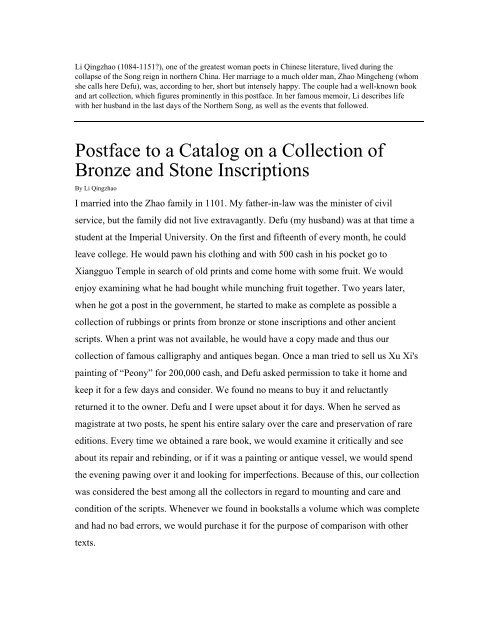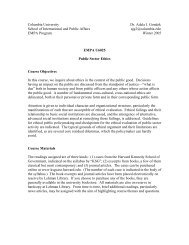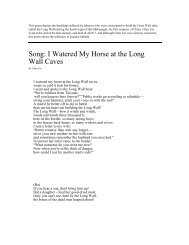Postface to a Catalog on a Collection of Bronze and Stone Inscriptions
Postface to a Catalog on a Collection of Bronze and Stone Inscriptions
Postface to a Catalog on a Collection of Bronze and Stone Inscriptions
You also want an ePaper? Increase the reach of your titles
YUMPU automatically turns print PDFs into web optimized ePapers that Google loves.
Li Qingzhao (1084-1151), <strong>on</strong>e <strong>of</strong> the greatest woman poets in Chinese literature, lived during the<br />
collapse <strong>of</strong> the S<strong>on</strong>g reign in northern China. Her marriage <str<strong>on</strong>g>to</str<strong>on</strong>g> a much older man, Zhao Mingcheng (whom<br />
she calls here Defu), was, according <str<strong>on</strong>g>to</str<strong>on</strong>g> her, short but intensely happy. The couple had a well-known book<br />
<strong>and</strong> art collecti<strong>on</strong>, which figures prominently in this postface. In her famous memoir, Li describes life<br />
with her husb<strong>and</strong> in the last days <strong>of</strong> the Northern S<strong>on</strong>g, as well as the events that followed.<br />
<str<strong>on</strong>g>Postface</str<strong>on</strong>g> <str<strong>on</strong>g>to</str<strong>on</strong>g> a <str<strong>on</strong>g>Catalog</str<strong>on</strong>g> <strong>on</strong> a Collecti<strong>on</strong> <strong>of</strong><br />
Br<strong>on</strong>ze <strong>and</strong> S<str<strong>on</strong>g>to</str<strong>on</strong>g>ne Inscripti<strong>on</strong>s<br />
By Li Qingzhao<br />
I married in<str<strong>on</strong>g>to</str<strong>on</strong>g> the Zhao family in 1101. My father-in-law was the minister <strong>of</strong> civil<br />
service, but the family did not live extravagantly. Defu (my husb<strong>and</strong>) was at that time a<br />
student at the Imperial University. On the first <strong>and</strong> fifteenth <strong>of</strong> every m<strong>on</strong>th, he could<br />
leave college. He would pawn his clothing <strong>and</strong> with 500 cash in his pocket go <str<strong>on</strong>g>to</str<strong>on</strong>g><br />
Xiangguo Temple in search <strong>of</strong> old prints <strong>and</strong> come home with some fruit. We would<br />
enjoy examining what he had bought while munching fruit <str<strong>on</strong>g>to</str<strong>on</strong>g>gether. Two years later,<br />
when he got a post in the government, he started <str<strong>on</strong>g>to</str<strong>on</strong>g> make as complete as possible a<br />
collecti<strong>on</strong> <strong>of</strong> rubbings or prints from br<strong>on</strong>ze or s<str<strong>on</strong>g>to</str<strong>on</strong>g>ne inscripti<strong>on</strong>s <strong>and</strong> other ancient<br />
scripts. When a print was not available, he would have a copy made <strong>and</strong> thus our<br />
collecti<strong>on</strong> <strong>of</strong> famous calligraphy <strong>and</strong> antiques began. Once a man tried <str<strong>on</strong>g>to</str<strong>on</strong>g> sell us Xu Xi's<br />
painting <strong>of</strong> “Pe<strong>on</strong>y” for 200,000 cash, <strong>and</strong> Defu asked permissi<strong>on</strong> <str<strong>on</strong>g>to</str<strong>on</strong>g> take it home <strong>and</strong><br />
keep it for a few days <strong>and</strong> c<strong>on</strong>sider. We found no means <str<strong>on</strong>g>to</str<strong>on</strong>g> buy it <strong>and</strong> reluctantly<br />
returned it <str<strong>on</strong>g>to</str<strong>on</strong>g> the owner. Defu <strong>and</strong> I were upset about it for days. When he served as<br />
magistrate at two posts, he spent his entire salary over the care <strong>and</strong> preservati<strong>on</strong> <strong>of</strong> rare<br />
editi<strong>on</strong>s. Every time we obtained a rare book, we would examine it critically <strong>and</strong> see<br />
about its repair <strong>and</strong> rebinding, or if it was a painting or antique vessel, we would spend<br />
the evening pawing over it <strong>and</strong> looking for imperfecti<strong>on</strong>s. Because <strong>of</strong> this, our collecti<strong>on</strong><br />
was c<strong>on</strong>sidered the best am<strong>on</strong>g all the collec<str<strong>on</strong>g>to</str<strong>on</strong>g>rs in regard <str<strong>on</strong>g>to</str<strong>on</strong>g> mounting <strong>and</strong> care <strong>and</strong><br />
c<strong>on</strong>diti<strong>on</strong> <strong>of</strong> the scripts. Whenever we found in bookstalls a volume which was complete<br />
<strong>and</strong> had no bad errors, we would purchase it for the purpose <strong>of</strong> comparis<strong>on</strong> with other<br />
texts.
I have a power for memory, <strong>and</strong> sometimes after supper, sitting quietly in the<br />
Homecoming Hall, we would boil a pot <strong>of</strong> tea <strong>and</strong>, pointing <str<strong>on</strong>g>to</str<strong>on</strong>g> the piles <strong>of</strong> books <strong>on</strong> the<br />
shelves, make a guess as <str<strong>on</strong>g>to</str<strong>on</strong>g> which line <strong>of</strong> which page in which volume <strong>of</strong> a book<br />
c<strong>on</strong>tained a certain passage <strong>and</strong> see who was right, the <strong>on</strong>e making the correct guess<br />
having the privilege <strong>of</strong> drinking his cup <strong>of</strong> tea first. When a guess was correct, we would<br />
lift up the cup <strong>and</strong> break out in<str<strong>on</strong>g>to</str<strong>on</strong>g> a loud laughter, so much so that sometimes the tea was<br />
spilled <strong>on</strong> our dress <strong>and</strong> we were not able <str<strong>on</strong>g>to</str<strong>on</strong>g> drink at all. We were then c<strong>on</strong>tent <str<strong>on</strong>g>to</str<strong>on</strong>g> live<br />
<strong>and</strong> grow old in the world! Therefore, we held our heads high, although we were living<br />
in poverty <strong>and</strong> sorrow.... In time our collecti<strong>on</strong> grew bigger <strong>and</strong> bigger <strong>and</strong> the books<br />
<strong>and</strong> art objects were piled up <strong>on</strong> tables <strong>and</strong> desks <strong>and</strong> beds, <strong>and</strong> we enjoyed them with<br />
our eyes <strong>and</strong> with our minds <strong>and</strong> planned <strong>and</strong> discussed the collecti<strong>on</strong>, tasting a<br />
happiness above those enjoying the horse races <strong>and</strong> music <strong>and</strong> dance.<br />
In the year 1126, Defu was magistrate at Zezhuan when the northern invaders threatened<br />
the nati<strong>on</strong>al capital. He had a presentiment that we were not going <str<strong>on</strong>g>to</str<strong>on</strong>g> be able <str<strong>on</strong>g>to</str<strong>on</strong>g> keep the<br />
collecti<strong>on</strong> intact during the ensuing chaos. The following year, we came down south <strong>on</strong><br />
the occasi<strong>on</strong> <strong>of</strong> the funeral for his mother. We realized that a part <strong>of</strong> the collecti<strong>on</strong> had <str<strong>on</strong>g>to</str<strong>on</strong>g><br />
be sacrificed. First we discarded the heavy, bulky volumes, the less important works <strong>of</strong> a<br />
painter, <strong>and</strong> vessels that bore no inscripti<strong>on</strong>s. Next we threw out books <strong>of</strong> which<br />
st<strong>and</strong>ard editi<strong>on</strong>s existed, paintings <strong>of</strong> no extraordinary merit, <strong>and</strong> br<strong>on</strong>ze that was <str<strong>on</strong>g>to</str<strong>on</strong>g>o<br />
heavy for transportati<strong>on</strong>. Even then, the collecti<strong>on</strong> filled fifteen cartloads <strong>and</strong> was<br />
carried in a fleet <strong>of</strong> boats when we came down the Huai River. We had planned <strong>on</strong><br />
moving things kept at our old house at Jingzhou the following year, but the house, we<br />
found later, was burned down with its dozen roomfuls <strong>of</strong> objects.<br />
In 1129, we were living at Zhiyang. Defu had <str<strong>on</strong>g>to</str<strong>on</strong>g> go <str<strong>on</strong>g>to</str<strong>on</strong>g> the temporary capital. As he s<str<strong>on</strong>g>to</str<strong>on</strong>g>od<br />
<strong>on</strong> the bank <str<strong>on</strong>g>to</str<strong>on</strong>g> say good-bye, I felt sick at heart <strong>and</strong> asked, “What shall I do in case <strong>of</strong><br />
trouble” He replied from the bank, “Do as the others. If necessary, ab<strong>and</strong><strong>on</strong> the food<br />
supplies first, then the clothing; books next, the scrolls after that, <strong>and</strong> the br<strong>on</strong>ze last <strong>of</strong>
all. But never part with the S<strong>on</strong>g ware no matter what happens. And take good care <strong>of</strong><br />
it!” Then he left <strong>on</strong> horseback.<br />
In August, Defu died <strong>of</strong> an illness. At that time, the imperial court was fleeing <str<strong>on</strong>g>to</str<strong>on</strong>g><br />
Jiangxi. I asked two employees <str<strong>on</strong>g>to</str<strong>on</strong>g> bring more than 20,000 volumes <strong>of</strong> books <strong>and</strong> over<br />
2,000 prints <strong>of</strong> inscripti<strong>on</strong>s <str<strong>on</strong>g>to</str<strong>on</strong>g> H<strong>on</strong>gzhou first. In winter <strong>of</strong> that year, the <str<strong>on</strong>g>to</str<strong>on</strong>g>wn fell <strong>and</strong> all<br />
was lost. What we had brought down the river in a fleet <strong>of</strong> boats was all g<strong>on</strong>e. What was<br />
saved were a few small scrolls, the works <strong>of</strong> Li Bo, Du Fu, Han Yu, <strong>and</strong> Liu Z<strong>on</strong>gyuan,<br />
the Shishuo, the Debate <strong>on</strong> Ir<strong>on</strong> <strong>and</strong> Salt, several dozens <strong>of</strong> rubbings, over a dozen<br />
pieces <strong>of</strong> br<strong>on</strong>ze, <strong>and</strong> several boxes <strong>of</strong> Southern Tang His<str<strong>on</strong>g>to</str<strong>on</strong>g>ry, which happened <str<strong>on</strong>g>to</str<strong>on</strong>g> be<br />
with me in my pers<strong>on</strong>al luggage. As I could not have g<strong>on</strong>e upriver, I came down south<br />
<strong>and</strong> moved from Daizhou, <str<strong>on</strong>g>to</str<strong>on</strong>g> Wenzhou, <str<strong>on</strong>g>to</str<strong>on</strong>g> Chuzhou, <str<strong>on</strong>g>to</str<strong>on</strong>g> Yuezhou, finally <str<strong>on</strong>g>to</str<strong>on</strong>g> Hangzhou,<br />
<strong>and</strong> had the collecti<strong>on</strong> s<str<strong>on</strong>g>to</str<strong>on</strong>g>red at Zhengxian. In 1130, rebel troops came <str<strong>on</strong>g>to</str<strong>on</strong>g> the <str<strong>on</strong>g>to</str<strong>on</strong>g>wn <strong>and</strong><br />
raided it, <strong>and</strong> all that passed in<str<strong>on</strong>g>to</str<strong>on</strong>g> the ownership <strong>of</strong> old General Li. About 50 or 60 per<br />
cent <strong>of</strong> what had been saved was again g<strong>on</strong>e. I had still six or seven baskets which I<br />
brought with me when I moved <str<strong>on</strong>g>to</str<strong>on</strong>g> Yuezheng. One night, a burglar came <strong>and</strong> got away<br />
with five baskets. What I have left now are <strong>on</strong>ly a few odd volumes <strong>of</strong> several<br />
incomplete books.<br />
I suddenly came up<strong>on</strong> this <str<strong>on</strong>g>Catalog</str<strong>on</strong>g> (compiled by my husb<strong>and</strong>) <strong>and</strong> the feeling was like<br />
that <strong>of</strong> meeting an old friend. I remember when we were living at D<strong>on</strong>glai at our house<br />
called “Qingzhitang,” Defu was working every day <strong>on</strong> the volumes, giving each ten<br />
volumes a protecting cloth case with silk fastenings. Usually, he checked over two<br />
volumes per day <strong>and</strong> wrote a postscript note <strong>on</strong> <strong>on</strong>e volume. Am<strong>on</strong>g the 2,000 volumes<br />
<strong>of</strong> prints from s<str<strong>on</strong>g>to</str<strong>on</strong>g>ne <strong>and</strong> br<strong>on</strong>ze, <strong>on</strong>ly 502 now bear his signature <strong>and</strong> notes. The ink is as<br />
fresh as the day he wrote them, but the tree over his grave has shot up <str<strong>on</strong>g>to</str<strong>on</strong>g> a c<strong>on</strong>siderable<br />
height already. I realize that this is the comm<strong>on</strong> fate <strong>of</strong> things: they come <strong>and</strong> go, or<br />
change ownership or are destroyed. There is nothing surprising in it. I merely write this<br />
s<str<strong>on</strong>g>to</str<strong>on</strong>g>ry down, that collec<str<strong>on</strong>g>to</str<strong>on</strong>g>rs may take warning from it.
The fourth year <strong>of</strong> Shaoxing (1134)<br />
Translated by Lin Yutang<br />
Source: Mair, Vic<str<strong>on</strong>g>to</str<strong>on</strong>g>r, ed. The Columbia Anthology <strong>of</strong> Traditi<strong>on</strong>al Chinese Literature.<br />
New York: Columbia University Press, 1994. 1<br />
1 "Br<strong>on</strong>ze <strong>and</strong> S<str<strong>on</strong>g>to</str<strong>on</strong>g>ne Inscripti<strong>on</strong>s," Micros<strong>of</strong>t® Encarta® Encyclopedia 2000. © 1993-<br />
1999 Micros<strong>of</strong>t Corporati<strong>on</strong>. All rights reserved.





